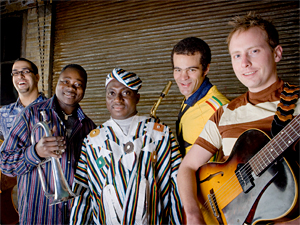A PLATFORM FOR THOUGHT AND HUMANITY "In generosity and helping others, be like a river. In compassion and grace, be like the sun. In concealing other's faults, be like the night. In anger and fury, be like dead. In modesty and humility, be like the earth. In tolerance, be like the sea. Either appear as you are, or be as you appear" (Mevlana Rumi) "Wisdom is not a product of schooling but of the life-long attempt to acquire it" (Albert Einstein) (Contact Address: reflectioncafe@gmail.com)
Monday, August 11, 2014
International Orders in the Early Modern World
Thursday, June 05, 2008
African Development Review (4/2008)

African Development Review
April/Avril 2008 - Vol. 20 Issue 1 Page 1-162
Introduction: Globalization–Poverty Channels and Case Studies from Sub-Saharan Africa
Machiko Nissanke and Erik Thorbecke
pages 1–19
Gains from Trade: Implications for Labour Market Adjustment and Poverty Reduction in Africa
Augustin Kwasi Fosu and Andrew Mold
pages 20–48
The Effect of the Liberalization of Investment Policies on Employment and Investment of Multinational Corporations in Africa
Elizabeth Asiedu and Kwabena Gyimah-Brempong
pages 49–66
pages 67–93
Abena D. Oduro and Isaac Osei-Akoto
pages 94–114
Distributional Impact of Globalization-induced Migration: Evidence from a Nigerian Village
Steve Onyeiwu, Raluca Iorgulescu Polimeni and John M. Polimeni
pages 115–134
pages 135–162
Friday, May 02, 2008
Africa in America: Transatlantic Music
By Banning Eyre

The Occidental Brothers Dance Band International plays a mix of Central and West African dance styles.
.
NPR.org, April 2, 2008 - Every year, more and more U.S.-based bands emerge playing African music. Some revolve around talented African musicians living in America, as with Kaleta, the Nigerian singer at the center of Akoya Afrobeat. Others are collaborative efforts between artists living in Africa and the U.S. That's the case with Burkina Electric and Extra Golden. Then there are bands of Americans who simply feel inspired to play African music, as with the Occidental Brothers Dance Band International. And finally, there are those nomadic types who travel to Africa to record, perform, and bring the music — and sometimes the musicians — back to the U.S. That's the case with Markus James.
These acts keep getting better. They don't yet constitute a recognized sub-genre, but they will: The music these groups play is palpably different from any existing homegrown genre on either side of the Atlantic. All five acts are featured on Afropop Worldwide's "Africa in America 2008" program. Click here to find out more about these and other Africa in America bands.

Occidental Brothers Dance Band International
This Chicago-based band specializes in classic Afropop styles. It's especially good with the squirrelly, sensuous sound of 1960s Congolese music, the sound Africans of that era called "rumba." The Occidental Brothers -- the name is a play on Nigeria's Oriental Brothers -- further distinguish themselves by playing entirely instrumental music.

Burkina Electric
Composer and percussionist Lukas Ligeti (son of classical composer Gyorgy Ligeti) has been traveling to Africa to record and perform for the past 14 years. This project grew out of his collaboration with a talented young singer from Burkina Faso named Mai Lingani. The group combines electronics, traditional music, and Afropop aesthetics to arrive at something unique.

Akoya Afrobeat
Iconic Nigerian musician Fela Kuti transformed the world-music landscape by inventing Afrobeat, a blend of funk, jazz, West African music, and bold people's politics. A decade after Kuti's death, Afrobeat is bigger than ever: There are at least three Afrobeat bands in New York City alone. This one delivers the real deal, with Kaleta, a singer who worked with Kuti, at the center of a juggernaut of brass, guitars, percussion, and vocalists.

Markus James
California singer-songwriter Markus James first went to Mali to record his songs with African collaborators in 1994, and he's been going back ever since. If many American roots musicians have followed, it's likely because the connections between traditional music in the two countries are so provocative and fascinating. With his ever-widening circle of talented collaborators, James has created a diverse body of work. This album alone involves musicians from Mississippi, Niger, and various parts of Mali.

Extra Golden
The Americans in this band are rock 'n' rollers. The Kenyans came up playing a guitar-based dance style called benga. The band is the brainchild of ethnomusicologist Ian Eagleson, who went to Kenya to study benga, and wound up founding Extra Golden. The blend is fresh and surprising, proof that boogie music is a universal language.
To listen the songs, click the related NPR link:
Monday, October 30, 2006
Economy, Politics and Culture in the Global World (IV)
Economic Justice in an Unfair World, Ethan B. Kapstein
Questions of Fairness , Robert H. Wade
Globalization or Europeanization? Evidence on the European Economy Since 1980 , N.Fligstein & F. Merand
The Globalization Index, P. Laudicina, M. Naim, D. Bosco
Constructing Sustainable Development, Neil E. Harrison
Worlds Apart: Measuring International and Global Inequality, Branko Milanovic
A Corporate Solution to Global Poverty: How Multinationals Can Help the Poor and Invigorate Their Own Legitimacy, G. Lodge & C. Wilson
The India Model, Gurcharan Das
Islam and the Moral Economy: The Challenge of Capitalism , Charles Tripp
How to Help Poor Countries, N. Birdsall D.Rodrik, and A. Subramanian
Social Watch Report 2005: Focus on Gaps Between Promises and Action
The Millennium Development Goals: The Struggle Against Poverty in the Global Economy(Video), Jeff Sachs
Africa's Poverty Trap: Causes & Solutions , Jeffrey D. Sachs et al
Less Than 0.7 Percent of Rich-country GNP Could Spring Africa from Poverty Trap , Earth Institute News
Environmental Degradation and Global Development, Center for Global Development
The Planet in Peril, Jim Hansen
The Craft of International History: A Guide to Method, Marc Trachtenberg
The Siginificance and Roles of Teaching Theory in International Relations , Stefano Guzzini
Partners or Rivals?: European-American Relations After Iraq War , M. Evangelista & V. E. Parsi (Eds.)
Out from the shadows, Chris Patten & Timothy G. Ash
Secular Europe and Religious America: Implications for Transatlantic Relations , The Pew Forum on Religion & Public Life
History, Fear and Hypocrisy in the New World Order , David Runciman
God's Country?, Walter Russell Mead
The Israel Lobby and U.S. Foreign Policy , John J. Mearsheimer & Stephen Walt
Generating Momentum for a New Era in U.S.-Turkey Relations, Steven A. Cook & Elizabeth. S-Randall
Draft of the Declaration of WPF "Dialogue of Civilizations" - 2006 , World Public Forum
When Islam and Democracy Meet: Muslims in Europe and in the United States , Jocelyne Cesari
Working Papers, the Argentine Center of International Studies (CAEI)
The Relative Universality of Human Rights , Jack Donnelly
Human Rights Policy and International Relations: Realist Foundations Reconsidered, Saban Kardas
Is Humanity Enough? The Secular Theology of Human Rights , Peter Fitzpatrick
The Purpose of Intervention, Emilian Kavalski
Universal Human Rights, Eric K. Leonard
Child Labor through a Human Rights Glass Brightly , Burns H. Weston & Mark B. Teerink
World Affairs (III)
World Affairs (II)
World Affairs (I)
Wednesday, August 24, 2005
Asia, Africa, Latin America II
Conversation about Human Rights Crisis in Darfur, HREA
The End of Colonialism? The Irony of Bandung Conference, Claude Arpi
Imperialism of the Fittest , V. Inozemtsev & S. Karaganov
China's Search for Stability with America, Wang Jisi
Rising Dragon and the American Eagle - Part I, David Shambaugh
Rising Dragon and the American Eagle - Part II, Robert Sutter
The Dragon Awakes, Ian Bremmer
China: Is it a Threat, or an Opportunity?, People's Daily Online
Contagious Capitalism: Globalization and the Politics of Labor in China, Mary Elizabeth Gallagher
Made in the PRC: Consumers in China, Amy Hanser
Domestic Threats to China's Rise, Adam Wolfe
China's Internet: Let a Thousand Filters Bloom, Rebecca MacKinnon
ChinaScope Magazine
The Schizophrenic Superpower, Alan Dupont
India's Promise? Conflicting Prospects for the World's Most Populous Democracy, Devesh Kapur
India: America's New Ally?, Stephen P. Cohen
The India Imperative, Robert D. Blackwill
An Axis of Democracy?, Rajan Menon & Swati Pandey
Regional Integration in East Asia: Challenges and Opportunities- Part I: History and Institutions , E. Sakakibara & S. Yamakawa
Virginia Review of Asian Studies, VCAS
Comparative Connections (E-Journal on East Asian Bilateral Relations), CSIS
International Third World Studies Journal and Review, Univ. of Nebraska
Inter Press Service News Agency
Pakistan: Between Mosque and Military, Husain Haqqani
An Inquiry into the D-8 Experiment: An Incipient Model of an Islamic Common Market?, Berdal Aral
Economist Blames Aid for Africa Famine , Yahoo News
Millennium Development Goals: Moving Backwards, Gustavo Capdevila
Global Anti-Poverty Campaign Hangs in the Balance, Haider Rizvi
The Dollar and Development, Richard Sabot
(Mis)Understanding Chávez and Venezuela in Times of Revolution, L. Vivas & J. Pablo Lupi
Boletín Tecnología para la Organización Pública
Educational Portal of the Americas
.
Africa, Asia, Latin America (I)
.
Monday, April 18, 2005
Africa, Asia, Latin America (I)
Darfur and the Genocide Debate, Scott Straus
The Politics of Slaughter in Sudan, Dan Connell
Human Rights in Darfur, Sudan: Online Chat Transcripts
Ivory Coast: Colonial Adventure, Boubacar Boris Diop
Africa Policy Outlook 2005, Ann-Louise Colgan
Slave Trade: A Root of Contemporary African Crisis, Tunde Obadina
Gallup Poll of China China-India Entente Shifts Global Balance, Clyde Prestowitz
Passage to China, Amartya Sen
Asia Battles Over War History, David McNeill & Mark Selden
Millions of Indians Await Benefits of Globalization ,Jessica Einhorn
The Shaky Peace Over Kashmir, Gerald Meyerle
Liberty for Latin America: How to Undo Five Hundred Years of State Oppression, Alvaro Vargas Llosa
Can Debtors be Choosers?, Daniel Marx McCarthy
Where Do Poor Countries Get Their Policy Ideas?, Nadeem Ul Haque
Globalization Is Not Made in the West, Robbie Robertson
.
Saturday, April 16, 2005
Human Rights in Darfur, Sudan: Online Chat Transcripts
Amnesty International continues to be deeply concerned about the severe humanitarian and human rights crisis in Darfur, Sudan. Over 50,000 people are believed to have been killed and thousands of others have died as a result o conflict related hardship and disease since the conflict in Darfur erupted two years ago. Systematic human rights abuses have been committed by all parties involved in the conflict, but primarily by the Sudanese government and government-backed Janjawid militia. Over 1.5 million civilians have been internally displaced by the conflict and 200,000 have sought refuge in neighboring Chad.
Friday, April 15, 2005
Hotel Rwanda, When The World Closed its Eyes, He Opened His Arms.
The Rwandan conflict of the 1990s marked one of the bloodiest chapters in recent African history. The genocide was made all the more tragic by the fact that most of the world chose to ignore the conflict and the plight of the Rwandan people. While occasional reports about "tribal warfare" in Rwanda were carried by international news agencies, the horror of the conflict, instead of causing international outrage, seemed to be written off as another "third world incident" and not worthy of attention.

